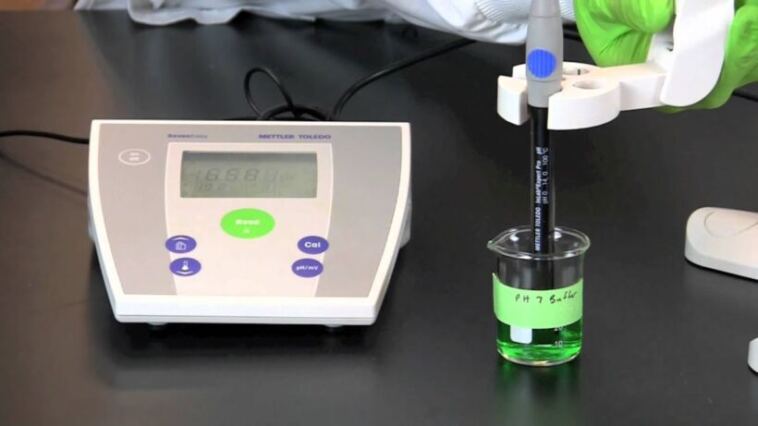- Like
- SHARE
- Digg
- Del
- Tumblr
- VKontakte
- Flattr
- Buffer
- Love This
- Save
- Odnoklassniki
- Meneame
- Blogger
- Amazon
- Yahoo Mail
- Gmail
- AOL
- Newsvine
- HackerNews
- Evernote
- MySpace
- Mail.ru
- Viadeo
- Line
- Comments
- Yummly
- SMS
- Viber
- Telegram
- JOIN
- Skype
- Facebook Messenger
- Kakao
- LiveJournal
- Yammer
- Edgar
- Fintel
- Mix
- Instapaper
- Copy Link
Keeping the pH in the optimal range ensures your plant can access all the necessary nutrients, leading to improved growth and awesome yields!”
Introduction
The success of growing cannabis largely depends on the quality of the soil, and one of the most crucial factors that influence this is the pH level.
A balanced pH ensures that your cannabis plants can absorb nutrients efficiently. With a plethora of pH meters available in the market, it’s essential to choose one that’s accurate and suitable for cannabis cultivation.
In this article, we’ll delve into some of the most popular pH meters for growing cannabis and what to look for when purchasing one.
Popular pH Meters for Growing Cannabis
Growing cannabis requires precision, and one key factor is maintaining the right pH levels. Let’s dive into the most popular pH meters that cannabis cultivators swear by for optimal growth.
#1. Sonkir 3-in-1 Soil pH Meter
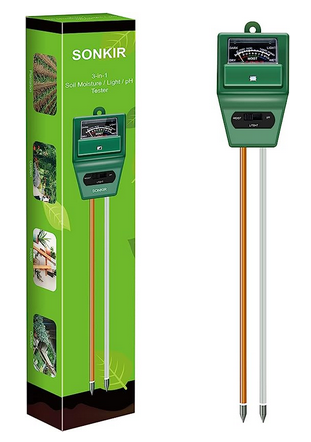
When it comes to ensuring the optimal growth of cannabis plants, understanding the soil’s pH is crucial. The Sonkir 3-in-1 Soil pH Meter emerges as a top contender in the realm of soil testing devices, especially for cannabis cultivation.
The Sonkir Soil pH Meter is not just a pH tester; it’s a versatile tool that offers three significant functionalities in one compact device. It measures soil pH, moisture levels, and light intensity, making it an invaluable asset for every cannabis grower.
One of the standout features of this meter is its user-friendly interface. Even if you’re new to cannabis cultivation, you’ll find the Sonkir’s display easy to read and interpret. It provides clear indications of the pH range, moisture content, and the light intensity your plants are receiving. This ensures that growers can make informed decisions about watering, lighting, and soil amendments.
The device is equipped with an advanced light-sensing receiver, enhancing its sensitivity to light changes. This is particularly beneficial for those who want to ensure their plants are receiving the right amount of light for optimal growth.
Another commendable feature is the inclusion of high-performance double sensors. These sensors are not only sensitive to changes in pH and moisture but also respond faster, ensuring that you get accurate readings without any significant delays.
However, what truly sets the Sonkir 3-in-1 Soil pH Meter apart is its battery-free operation. There’s no need to worry about changing batteries or the device running out of power. Simply insert it into the soil, and it’s ready to provide you with the data you need.
In terms of drawbacks, one potential issue is its performance in dry soil. There have been instances where the meter may not function optimally in extremely dry conditions. However, this is a minor concern and can be easily addressed by ensuring the soil is slightly moist before testing.
What We Liked:
- Three-in-one functionality, eliminating the need for multiple devices.
- Expanded readout scale for enhanced accuracy.
- Battery-free operation.
- Upgraded double sensors for superior pH and moisture detection.
- Lightweight design suitable for both indoor and outdoor plants.
What We Didn’t Like:
- Might not function optimally in extremely dry soil.
In conclusion, the Sonkir 3-in-1 Soil pH Meter is a reliable, efficient, and user-friendly device that every cannabis grower should consider. Whether you’re a novice or an experienced cultivator, this pH meter can significantly enhance your plant care routine, ensuring that your cannabis plants thrive.
#2. Atree Soil pH Meter

The Atree Soil pH Meter is an essential tool for every cannabis cultivator who wishes to ensure the optimal health and growth of their plants. This 3-in-1 soil meter is designed to provide accurate readings of pH, light, and moisture levels, making it a comprehensive tool for monitoring the overall condition of the soil.
One of the standout features of the Atree Soil pH Meter is its easy-to-read scale. The calibrations on the scale are straightforward, with the pH in the red part (3.5-7) indicating acidity and the green part (7-8) indicating alkalinity. This clear demarcation helps growers quickly understand the pH levels of their soil and make necessary adjustments.
In terms of moisture readings, the meter provides a clear indication of the soil’s moisture content. The red part (1-3) signifies that the soil is dry, the green part (4-7) indicates that the soil is moist, and the blue part (8-10) shows that the soil is wet. This feature is particularly beneficial for ensuring that cannabis plants receive the right amount of water, preventing both overwatering and underwatering.
Another notable feature is the light sensor, which determines if the cannabis plants are receiving adequate light. The relative light intensity is measured on a scale ranging from 0 to 2000 LUX, providing growers with valuable insights into their plants’ light requirements.
Using the Atree Soil pH Meter is a breeze. Simply insert the probe about 2 to 4 inches into the soil, adjust the pH settings, and wait for the pointer to swing. Within a few minutes, growers can adjust the switch to note the soil’s pH, moisture, and light levels. After use, it’s recommended to remove the probe from the soil and clean it to ensure its longevity and accuracy.
What We Like:
- 3-in-1 functionality.
- Clear and easy-to-understand calibrations.
- No need for batteries or electricity.
- Highly sensitive probe for accurate pH readings.
What We Didn’t Like:
- The light sensor might not always be necessary for some users.
In conclusion, the Atree Soil pH Meter is a reliable and user-friendly tool that offers a comprehensive solution for monitoring the soil conditions essential for cannabis growth. Its multifunctional capabilities, combined with its ease of use, make it a must-have for both novice and experienced cannabis growers.
#3. Hofun Soil pH Meter
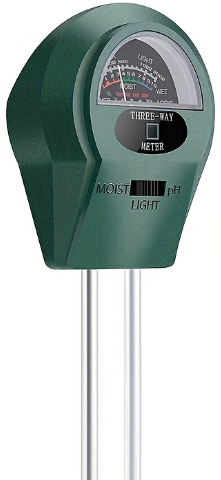
When it comes to ensuring the optimal growth of cannabis plants, the pH level of the soil plays a pivotal role. The Hofun Soil pH Meter emerges as a reliable tool for cannabis cultivators, offering a comprehensive 3-in-1 solution that measures not only pH but also moisture and light levels.
The Hofun Soil pH Meter is designed with the needs of both amateur and professional growers in mind. Its detailed readout scale is straightforward, with a pH range from 3.8 to 8, a moisture scale from 1 to 10, and a light scale that measures from 0 to 2000 LUX. This ensures growers have a clear understanding of the soil’s condition and the environment their cannabis plants are in.
One of the standout features of this meter is its three sensors. The light sensor, positioned just below the scale, provides insights into whether the cannabis plants are receiving adequate light. This is crucial as light plays a significant role in the photosynthesis process of the plants. The moisture sensor, on the other hand, gives a clear indication of when the plants need watering, ensuring they are neither overwatered nor left too dry. The pH sensor is equally vital, helping growers maintain the right soil acidity or alkalinity levels, which directly impacts nutrient absorption.
Another commendable aspect of the Hofun Soil pH Meter is its use of double needle detection technology. This advanced feature enhances the speed and accuracy of detecting and analyzing both pH acidity and soil moisture. Such precision is invaluable for growers aiming to provide the best environment for their cannabis plants.
Ease of use is another factor that makes the Hofun Soil pH Meter stand out. There’s no need for batteries or electricity; growers can simply insert it into the soil to get the readings. Moreover, its design ensures that even those new to cannabis cultivation can use it without any hassle.
However, like all products, the Hofun Soil pH Meter is not without its drawbacks. Some users might find the light sensor’s utility limited, especially if they already have other means of measuring light intensity. But, considering its overall functionality and the value it offers, this minor shortcoming can be overlooked.
What We Like:
- Three-in-one soil meter functionality.
- Clear readout with easy-to-decipher calibrations.
- No need for external power sources.
- Advanced double sensor design for enhanced accuracy.
What We Didn’t Like:
- The light sensor might not be of use to everyone.
In conclusion, the Hofun Soil pH Meter is a valuable tool for anyone involved in cannabis cultivation. Its multifunctional capabilities, combined with its ease of use and accuracy, make it a worthy investment for ensuring the best growth conditions for cannabis plants.
#4. Goksu Soil pH and Moisture Meter
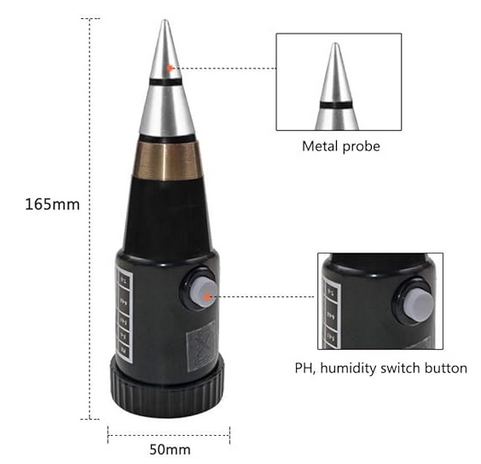
The Goksu Soil pH and Moisture Meter stands out as a reliable tool for those keen on ensuring the optimal health of their plants. This handheld device is designed with user-friendliness in mind, making it incredibly easy to operate right out of the box. Its robust construction ensures that it can withstand regular use, and its metal probe delves deep into the soil, ensuring enhanced detection of moisture, pure water, and pH levels.
One of the notable features of the Goksu meter is its metal sensing electrode. This electrode is specifically designed to provide accurate detection, ensuring that users get precise readings every time. However, it’s worth noting that this electrode does not have the capability to detect light, which might be a limitation for some users.
The meter is equipped with a durable and straightforward readout scale that measures 50 mm in diameter. This scale provides readings for pH levels ranging from 3 to 8 and moisture levels from 1 to 8. Such a range ensures that users can get a comprehensive understanding of the soil’s condition, allowing them to make informed decisions regarding plant care.
One of the standout features of the Goksu Soil pH and Moisture Meter is its independence from external power sources. Users don’t have to worry about batteries or electricity; the device is self-operating. This feature not only makes it convenient but also ensures that it can be used anywhere, anytime.
Installing and using the meter is a breeze. Users simply need to push it into the growing medium until all the metal rings are submerged, approximately to a depth of 2 inches. This ensures that the readings taken are representative of the soil’s actual condition.
However, a potential drawback to consider is the depth to which the probe penetrates the soil. Some users might find that it doesn’t go deep enough to provide a comprehensive assessment of the soil’s condition, especially in larger pots or garden beds.
What We Like:
- Highly sensitive metal electrode for precise readings.
- Simple design without the need for batteries.
- Ideal for both indoor and outdoor use.
What We Didn’t Like:
- Might not penetrate deep enough into the soil for some users.
In conclusion, the Goksu Soil pH and Moisture Meter is a valuable tool for both amateur and professional gardeners. Its ease of use, combined with its accurate readings, makes it a must-have for anyone serious about ensuring the best conditions for their plants. Whether you’re growing cannabis or any other plant, understanding the soil’s pH and moisture levels is crucial, and this meter provides that information in a simple and efficient manner.
#5. Veroyi Soil pH Meter
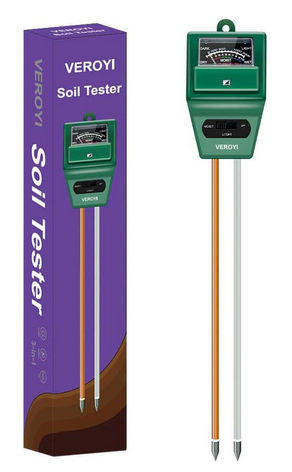
The Veroyi Soil pH Meter stands out as a versatile tool designed for both outdoor and indoor gardening enthusiasts. This device is not just limited to measuring the pH levels of the soil; it also provides insights into moisture levels and the light intensity received by plants. Such comprehensive data is crucial for cannabis growers, as it directly impacts the health and yield of the plants.
One of the most commendable features of the Veroyi Soil pH Meter is its simplicity in design. Gardeners don’t have to fuss over batteries or tangled wires, as this device operates without any external power source. Its user-friendly nature is further highlighted by the ease with which one can switch between different settings, allowing for continuous monitoring of pH, moisture, and light levels.
The display on this pH meter is straightforward and easy to interpret. It provides clear readings for all three measurements, ensuring that even those new to gardening can understand and act upon the data. The device’s advanced double sensor design ensures that the detection and analysis of the soil’s conditions are both accurate and swift. This is particularly beneficial for those who are keen on optimizing their plant care routine.
However, like all products, the Veroyi Soil pH Meter is not without its flaws. Some users might receive a defective unit, which can be a setback. But considering its features and the value it offers, it’s a minor hiccup in an otherwise efficient and reliable product.
What We Like:
- Easy-to-read display with accurate readings.
- Simple design without the need for batteries or electricity.
- Advanced double sensor design for enhanced accuracy.
What We Didn’t Like:
- Some users might receive a defective unit.
In conclusion, the Veroyi Soil pH Meter is a valuable addition to any gardener’s toolkit. Its three-in-one functionality combined with its ease of use makes it a top choice for those looking to enhance their plant care routine, especially for cannabis growers who understand the importance of maintaining the right pH and moisture levels in the soil.
What to Look for in the Best pH Meter?
When searching for the best pH meter, several factors come into play to ensure you get accurate and reliable results.
The best pH meter for you will depend on your specific needs, budget, and where you intend to use it. By considering different factors, you can make an informed decision and choose a pH meter that will serve you reliably for years to come.
Don’t know where to start? Here’s a comprehensive guide on what to look for in the best pH meter:
Types of pH Meters:
There are various types of pH meters available, including handheld, benchtop, and pen-style meters. Depending on your specific needs, whether it’s for laboratory use, field testing, or home use, you’ll want to choose the type that’s most convenient for you.
Accuracy:
The primary purpose of a pH meter is to measure the pH level accurately. Look for a meter that offers high precision and accuracy, usually within ±0.01 to ±0.02 pH units.
Calibration:
A good pH meter should offer easy calibration methods. Some meters come with auto-calibration features, while others might require manual calibration. Ensure the meter can be calibrated with standard buffer solutions.
Readout Scale:
A clear and easy-to-read display is crucial. Some advanced meters also come with backlit screens for better visibility in low-light conditions.
Advanced Detection Technology:
Modern pH meters often incorporate advanced electrode technology that provides faster and more accurate readings.
Ease of Use:
The pH meter should be user-friendly, with intuitive buttons and functions. It’s also beneficial if the meter comes with clear instructions or a user manual.
Durability and Build Quality:
Especially if you’re using the pH meter in the field or in rugged conditions, you’ll want a device that’s durable, water-resistant, and built to last.
Electrode Quality:
The quality of the electrode plays a significant role in the accuracy of the readings. Some pH meters come with replaceable electrodes, which can be a cost-effective feature in the long run.
Battery Life and Power Options:
Depending on your usage, consider the battery life of the pH meter. Some come with rechargeable batteries, while others use standard batteries. Some benchtop models might also offer an AC power option.
Data Storage and Connectivity:
Advanced pH meters can store multiple readings, which is useful for tracking changes over time. Some even offer connectivity options like USB or Bluetooth to transfer data to computers or other devices.
Temperature Compensation:
pH readings can be affected by temperature. A good pH meter will have automatic temperature compensation (ATC) to ensure accurate readings regardless of the ambient temperature.
Price and Brand Reputation:
While price is a consideration, it’s essential to balance cost with quality. Established brands often offer reliable and durable pH meters, and they might come with better customer support and warranties.
Application-Specific Features:
Depending on where you intend to use the pH meter, you might need specific features. For instance, if you’re testing soil, a soil pH meter would be more appropriate. Similarly, there are meters designed specifically for aquariums, hydroponics, or laboratory use.
Ask the Expert: Interview with Susan Cohen, Expert in Cannabis Cultivation and pH Monitoring
Max’s Harvest: Susan, thank you for joining us today. Let’s dive right in. Why is monitoring pH so crucial for cannabis cultivation?
Susan Cohen: Great question! Monitoring pH is essential because the pH level of the soil or growing medium directly impacts the cannabis plant’s ability to absorb nutrients. Keeping the pH in the optimal range ensures the plant can access all the necessary nutrients, leading to healthier growth and better yields.
Max’s Harvest: And what would you say is the ideal pH range for cannabis grown in soil?
Susan Cohen: For cannabis cultivated in soil, you’d want to aim for a pH range between 6.0 to 7.0. This range ensures the best nutrient absorption.
Max’s Harvest: Are there specific pH meters designed with cannabis cultivation in mind?
Susan Cohen: Absolutely. There are pH meters specifically tailored for the mediums used in cannabis cultivation, be it soil or hydroponic systems. These meters are calibrated to provide the most accurate readings for these particular environments.
Max’s Harvest: How often should growers calibrate their pH meters to ensure accurate results?
Susan Cohen: Regular calibration is key. For those who use their meters frequently, I’d recommend calibrating before each use. For occasional users, once a week or even once a month might suffice.
Max’s Harvest: Can growers use general-purpose pH meters for their cannabis plants?
Susan Cohen: While you can get readings from general-purpose pH meters, I always advise using a meter specifically designed for soil or hydroponic testing when growing cannabis. They’re tailored to give the most accurate readings for these mediums.
Max’s Harvest: I’ve heard of some pH meters offering additional features. Can you elaborate on that?
Susan Cohen: Yes, some modern 3-in-1 pH meters can measure not just pH, but also moisture and light levels. These meters offer a comprehensive view of both the soil’s condition and the plant’s environment, making them invaluable tools for growers.
Max’s Harvest: Any tips on maintaining and prolonging the life of a pH meter?
Susan Cohen: Certainly! It’s essential to clean the electrode with distilled water after each use. Storing it in a protective cap or a storage solution can also prolong its life. And, of course, regular calibration ensures the meter remains accurate and functional for longer.
Max’s Harvest: Digital vs. analog pH meters – which is more reliable?
Susan Cohen: In my experience, digital pH meters typically offer more consistent and accurate readings compared to their analog counterparts. Plus, they often come with added features that can be quite beneficial.
Max’s Harvest: How does temperature come into play with pH readings?
Susan Cohen: Temperature can indeed impact pH readings. That’s why many of the best pH meters come equipped with automatic temperature compensation. It ensures that the readings remain accurate, even if there are temperature fluctuations.
Max’s Harvest: Lastly, where can growers find reviews and recommendations for the best pH meters for cannabis cultivation?
Susan Cohen: There are many resources online, from forums to gardening websites and hydroponic store sites, that offer reviews and recommendations. It’s always a good idea to do thorough research and perhaps even consult with fellow growers.
Max’s Harvest: Susan, thank you for your insights and expertise on this topic. It’s been enlightening!
Susan Cohen: My pleasure! Always happy to share knowledge and help growers achieve the best results.
FAQ: Best pH Meters for Growing Cannabis
Maintaining the right pH level is crucial for the optimal growth of cannabis. Investing in a reliable pH meter can make a significant difference in the health and yield of your plants.
Here are some of the most frequently asked questions when it comes to cannabis pH and cannabis pH meters.
1. Why is pH important for growing cannabis?
The pH level of the soil or growing medium directly affects the plant’s ability to absorb nutrients. If the pH is too high or too low, it can lock out essential nutrients, leading to deficiencies and affecting the health and yield of the cannabis plant.
2. What is the ideal pH level for cannabis?
For soil-grown cannabis, the ideal pH range is between 6.0 to 7.0. For hydroponics or soilless mediums, the optimal range is slightly more acidic, between 5.5 to 6.5.
3. Are there different types of pH meters?
Yes, there are several types of pH meters, including handheld, benchtop, and pen-style meters. The choice depends on your specific needs, whether for on-the-go testing, laboratory use, or home use.
4. How often should I calibrate my pH meter?
It’s recommended to calibrate your pH meter regularly to ensure accurate readings. The frequency depends on usage; heavy users might calibrate before each use, while occasional users might calibrate once a week or month.
5. Can I use any pH meter for growing cannabis?
While you can use most pH meters, it’s best to choose one designed for soil or hydroponic testing when growing cannabis. These meters are calibrated to provide accurate readings for these specific mediums.
6. How do I maintain my pH meter?
To maintain your pH meter, clean the electrode after each use with distilled water. Store it in a protective cap or storage solution to prolong its life. Regular calibration also ensures it remains accurate.
7. Are digital pH meters better than analog ones?
Digital pH meters tend to offer more accurate and consistent readings compared to analog ones. They also often come with additional features like automatic temperature compensation and data storage.
8. What factors should I consider when buying a pH meter for cannabis cultivation?
Consider factors like accuracy, ease of calibration, durability, electrode quality, and battery life. Also, think about whether you need additional features like data storage or connectivity.
9. Do pH meters also measure moisture and light?
Some 3-in-1 pH meters can measure pH, moisture, and light. These are especially useful for growers as they provide a comprehensive overview of the soil’s condition and the plant’s environment.
10. How do temperature and pH relate?
Temperature can affect pH readings. Most quality pH meters come with automatic temperature compensation to ensure the readings remain accurate regardless of temperature fluctuations.
11. Where can I buy a reliable pH meter for growing cannabis?
You can purchase pH meters at gardening centers, hydroponic stores, or online retailers. It’s advisable to read reviews and choose a reputable brand to ensure reliability and accuracy.
12. How do I know if my pH meter is giving inaccurate readings?
Regular calibration can help ensure your pH meter’s accuracy. If you notice sudden, inconsistent readings or if the meter fails calibration, it might be time to replace the electrode or the entire unit.
How-to Video Guide: Using a pH Meter
The Takeaway
Maintaining the right pH level is crucial for the healthy growth of cannabis plants. With the right pH meter, like the Sonkir Soil pH Meter, growers can ensure that their plants have the optimal environment to flourish.
These tools not only measure pH but also provide insights into moisture and light conditions, making them indispensable for serious cannabis cultivators.
Whether you’re a novice or a seasoned grower, investing in a reliable pH meter is a step towards a successful harvest.
